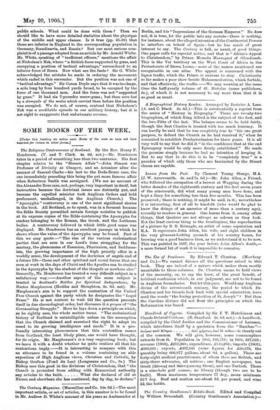The Religious Controversies of Scotland. By the Rev. Henry F.
Henderson. (T. and T. Clark. 4s. 6d. net.)—Mr. Henderson takes in a period of something less than two centuries. His first chapter relates to the " Simson Affair "—John Simson was Professor of Divinity at Glasgow, and an Arianizer after the manner of Samuel Clarke—his last to the Dods-Bruce case, the one immediately preceding this being the yet more famous affair when Robertson Smith was arraigned. (We see no account of the Alexander Ross case, not, perhaps, very important in itself, but instructive because the doctrinal issues are distinctly put, and because the expelled minister took Anglican Orders and held preferment, unchallenged, in the Anglican Church.) The "Apocrypha" controversy is one of the most significant stories in the book. All Scotland, so to speak, was in a ferment because the Bible Society permitted certain foreign societies to publish at its expense copies of the Bible containing the Apocrypha for readers belonging to the Roman, the Greek, and the Lutheran bodies. A controversy followed in which little good sense was displayed. Mr. Henderson has an excellent passage in which he shows where the value of the Apocrypha may be found. Part of
this we may quote The rise of the various ecclesiastical parties that are seen in our Lord's time struggling for the mastery, the phenomena of Essenism, Pharisaism, and Sadducee- ism, the growing importance of the high priestly office in a worldly sense, the development of the doctrines of angels and of a future life—these and other spiritual and social forces that are seen at work in the days of Christ and the Apostles can be studied in the Apocrypha by the student of the Gospels as nowhere else." Generally, Mr. Henderson has treated a very difficult subject in a satisfactory way.—Another aspect of the same subject is treated in Scotland's Battles for Spiritual Independence, by Hector Macpherson (Hodder and Stoughton, 3s. 6d. net). Mr. Macpherson's aim is to support the contention of the United Free Church against the party which he designates the " Legal Frees." He is not content to wait till the question presents itself in due chronological order, but discusses it a propos of "the Covenanting Struggle." Here he lays down a principle on which, as he rightly sees, the whole matter turns. "The ecclesiastical history of Scotland is unintelligible unless on the assumption that the Church claimed and exercised the right, to adapt its creed to its growing intelligence and needs." It is a pro- foundly interesting phenomenon that this contention comes from Scotland, the leaat likely place, one would have thought, for its origin. Mr. Macpherson's is a very engrossing book; but we leave it with a doubt whether he quite realises all that his contentions imply.—It is interesting to compare with this an utterance to be found in a volume containing an able exposition of High Anglican views, Christian and Catholic, by Bishop Grafton (Fond du Lac) (Longman and Co., Os.) The Bishop sees this good in the divisions of Christendom, that "the Church is protected from adding with Ecumenical authority any articles to the faith. . . . . . What she declared of old at Nicaea and elsewhere she has continued, day by day, to declare."






































 Previous page
Previous page